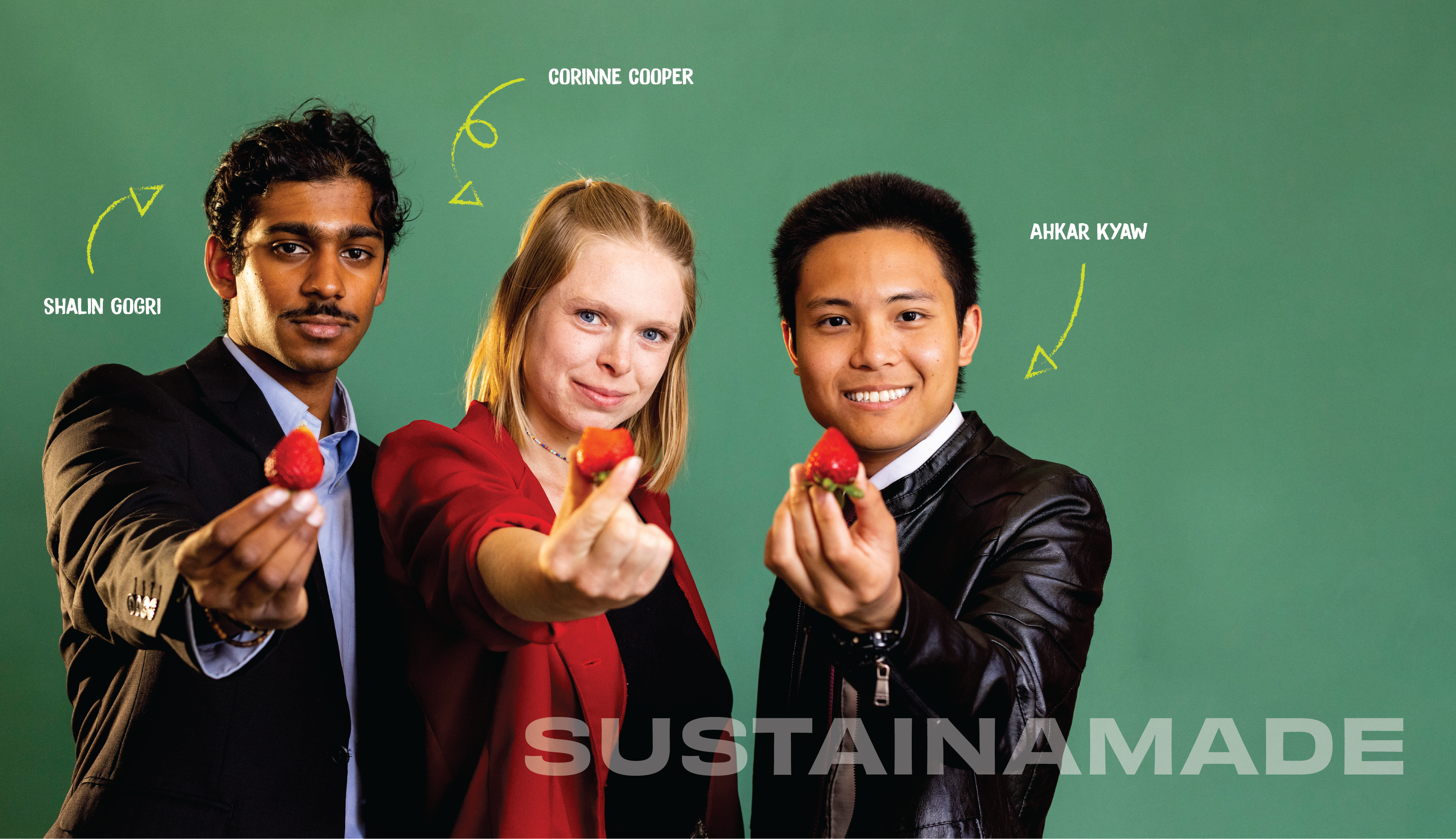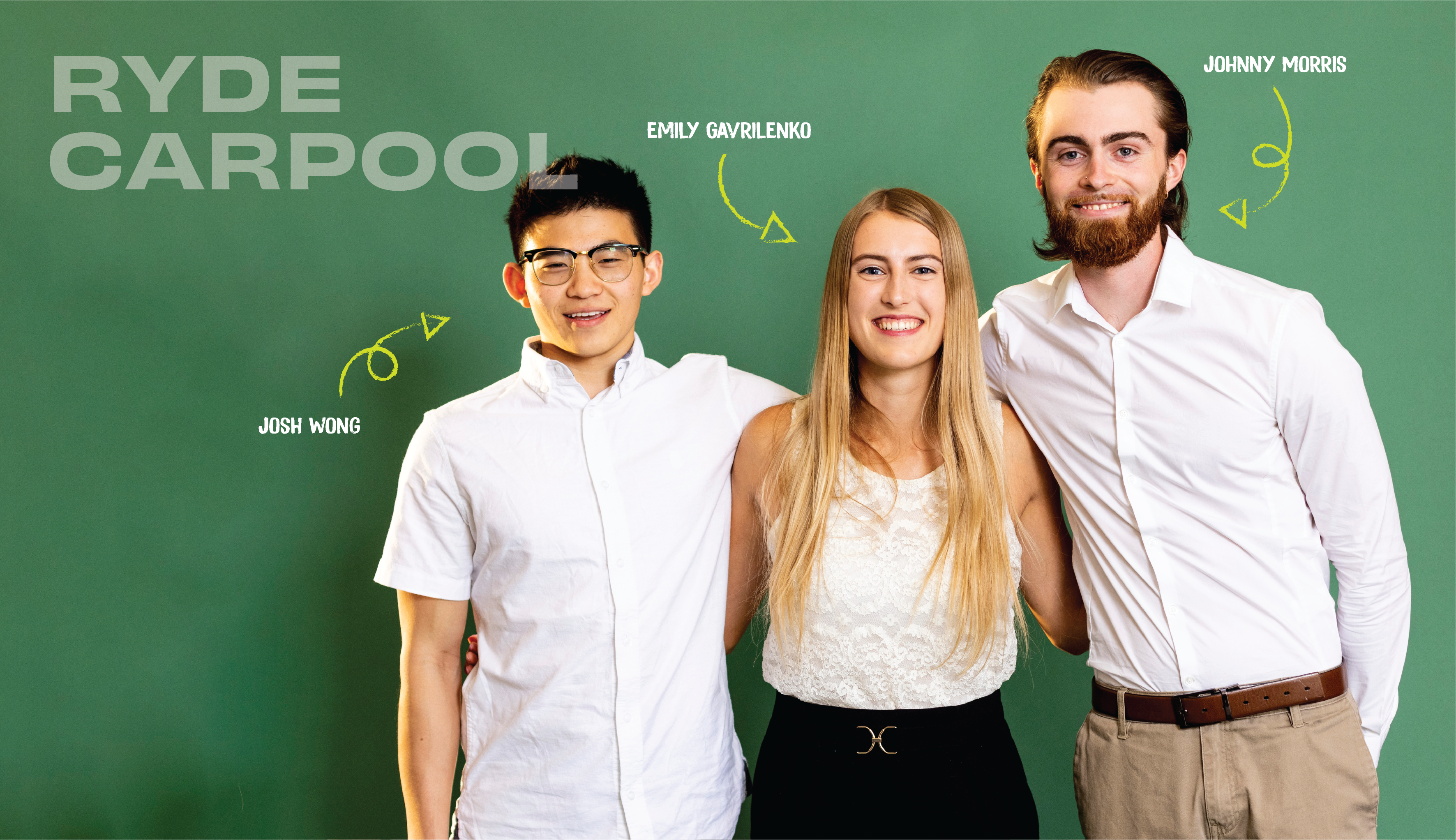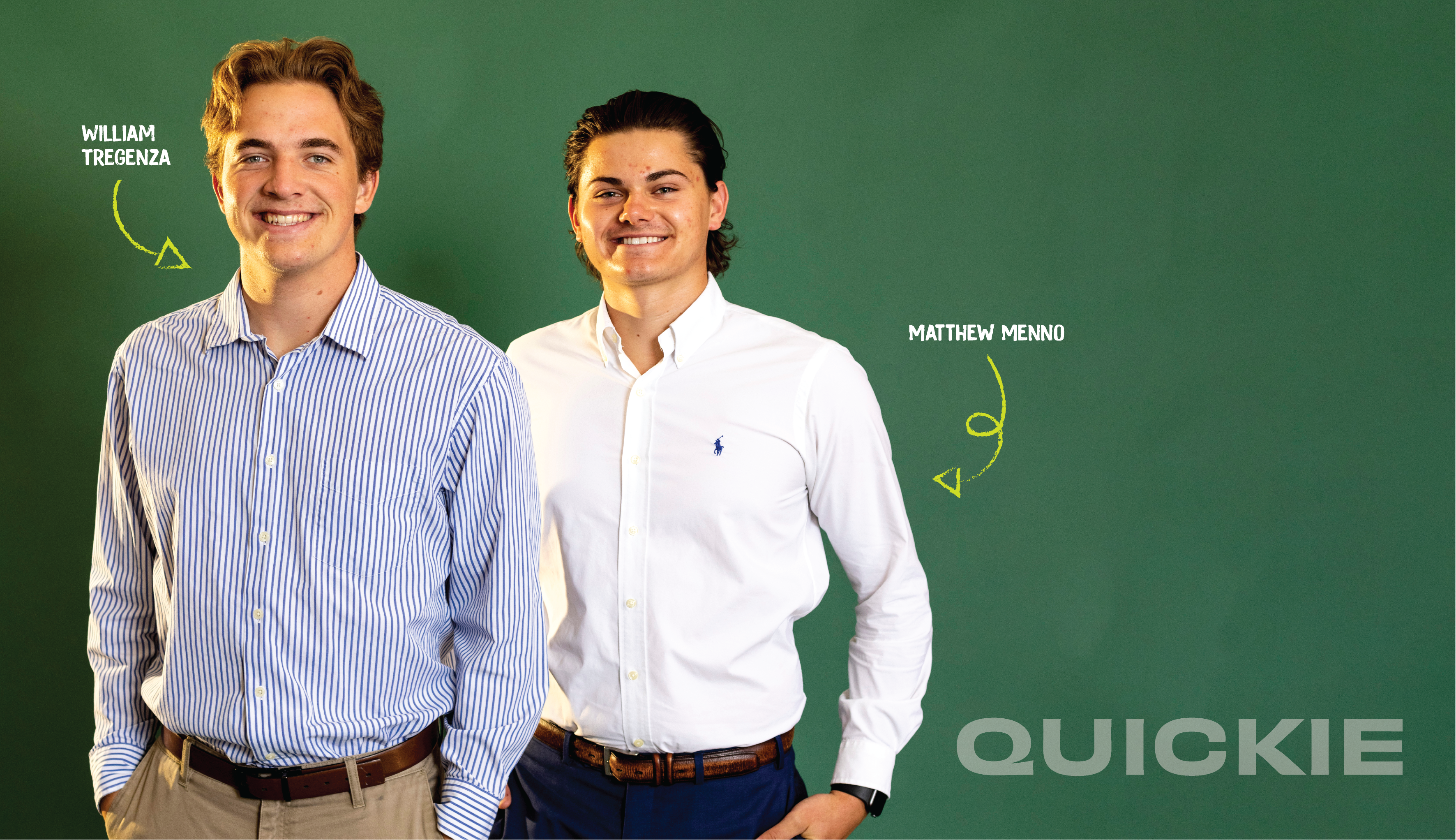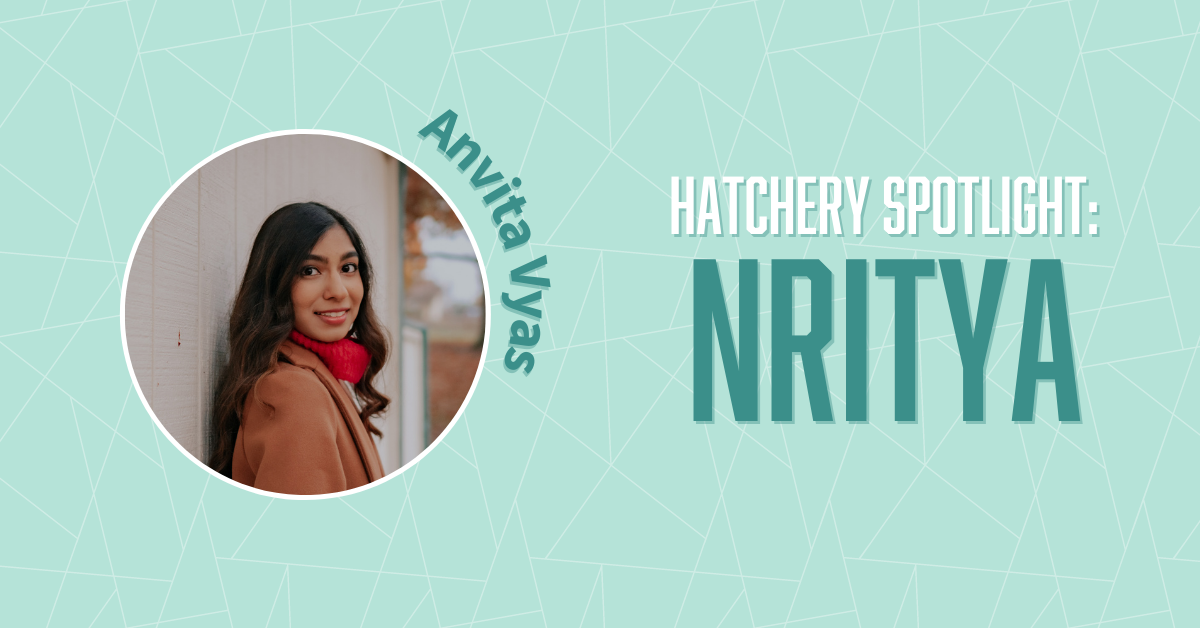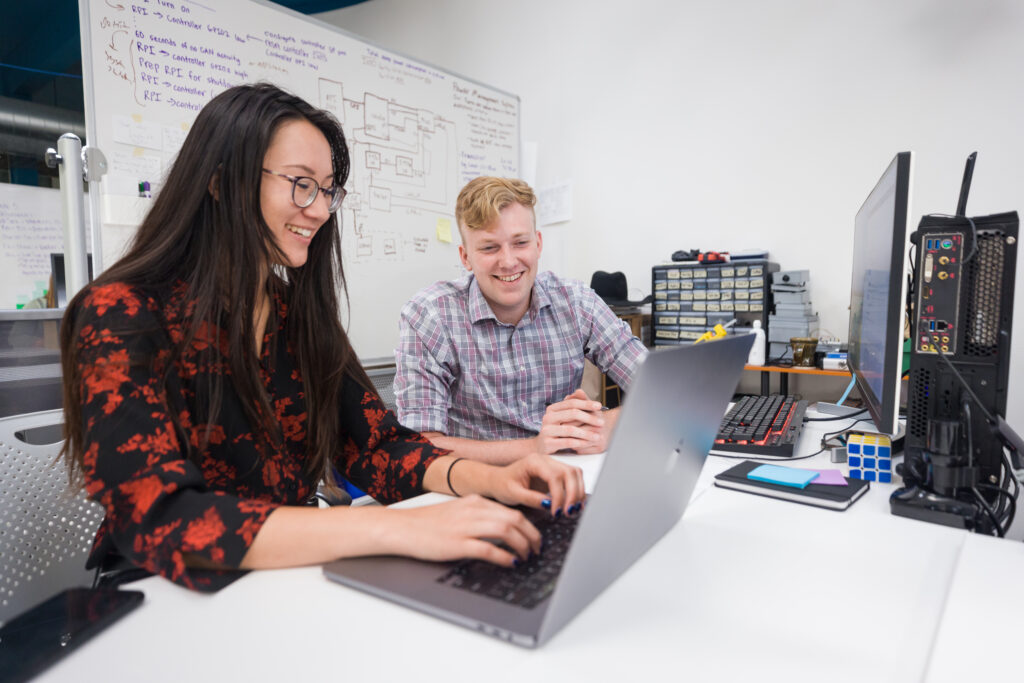It’s been almost nine months since the 2021 Cal Poly Center for Innovation and Entrepreneurship (CIE) Summer Accelerator came to an end. During the Accelerator, Cal Poly students and recent graduates spent three months immersed in the startup process, turning their startup ideas into real, scalable businesses.
The program culminated in Demo Day, where the teams showcased their hard work and pitched their companies.
Since Demo Day, our teams have grown as entrepreneurs and industry professionals. Here’s a team-by-team breakdown of what our 2021 Summer Accelerator teams are up to now:
ARTIFEX For Mom Care HiLite Intego Technology kit & sis OdinXR
S2 Monitoring Solutions TractorCloud Zoetic Motion
ARTIFEX

ARTIFEX co-founder Anna Baytosh (right) and team member Levi Schmitt at AngelCon. Photo by Ruby Wallau. Graphic by Emily Olstad.
ARTIFEX spent their summer creating a custom measuring tool to enable automation in the architecture industry.
Since the Summer Accelerator, ARTIFEX co-founders Elijah Williams and Anna Baytosh have expanded their team. They now have employees assisting with scientific research, technology development, customer development and market development.
According to Baytosh, the ARTIFEX team has been successful establishing their brand in the architecture industry. They are collecting feedback from architects who use their product and using that feedback to improve their innovation.
Baytosh said she also enjoyed “the opportunity to pitch [ARTIFEX’s] progress and talk to the community again” at the Cal Poly CIE Small Business Development Center’s (SBDC) AngelCon competition, held April 21 at SLO Brew Rock.
AngelCon is an annual competition for tech-driven startups on the Central Coast. ARTIFEX was one of the six startups competing for over $100,000 in funding in AngelCon 2022.
Weekly pitch workshops during the Accelerator prepared Baytosh to pitch in competitions like AngelCon, she said.
“The Accelerator helped get us moving and set a foundation for what a really good pitch looks like,” Baytosh said. “Now, being a few months out of the Accelerator and pitching to investors, we know what to say and what not to say.”
For Mom Care

For Mom co-founders Christina Grigorian (left) and Camila Monchini (right) at Demo Day. Photo by Joe Johnson. Graphic by Emily Olstad.
The Summer Accelerator helped For Mom Care begin building a postpartum recovery platform to provide mothers with holistic support and ensure they properly heal after birth.
Co-founders Camila Mochini and Christina Grigorian used the program as an opportunity to refine their original idea for For Mom Care, which Monchini described as “a one-stop-shop for postpartum care.”
At the start of the Accelerator, For Mom Care wanted to connect users with physical goods, community, education and a network of medical professionals.
“We had a lot of ambitions, but quickly realized it wasn’t possible to focus on so many aspects at once,” Monchini said.
Monchini and Grigorian, following the advice of their mentors, narrowed their focus to connecting new mothers with postpartum education and a network of postpartum experts.
Monchini said she was excited to showcase her startup’s growth at Demo Day.
“Pitching at Demo Day was exhilarating and nerve-wracking all wrapped up in one,” Monchini said. “Our eight-minute pitch seemed so long during the practice runs, and yet I felt like our pitch at Demo Day was over in a heartbeat.”
Following Demo Day, For Mom Care was invited to join the CIE Incubator, a two-year program for early-stage companies to develop into financially stable, high-growth enterprises. They are working with the Incubator to refine their business model and create the beta version of the For Mom Care platform, Monchini said.
Monchini said she is applying the lessons she learned during the Accelerator to her current work with For Mom Care.
“I [learned] it is key to surround yourself with people that believe in your team, believe in your mission and will bring positive and constructive energy to the table,” she said.
HiLite, formerly PowerMove

HiLite co-founders Sara Glaser (left) and Madison Lewandoski (right) at one of their pop-up classes. Photo courtesy of Madison Lewandowski. Graphic by Emily Olstad.
HiLite entered the Summer Accelerator as FEARLESS Fitness Kids, a startup working to keep children active by creating immersive video games with exercise as their core mechanic.
Over the course of the Accelerator, FEARLESS Fitness Kids rebranded and became PowerMove — and the rebrand was not the startup’s only change. PowerMove began to look at elementary schools as a customer segment, whereas FEARLESS Fitness Kids focused primarily on parents of young children.
Although PowerMove received investor interest at Demo Day, co-founders Sara Glaser and Madison Lewandowski are no longer pursuing the idea. Instead, they are pursuing HiLite.
HiLite — which stands for high-intensity, low-impact training exercise — is a workout methodology that uses patent-pending aerial loops and mini trampolines. It takes inspiration from dance, gymnastics and circus, according to Lewandowski.
“Our whole mission, since the beginning, is trying to make exercise fun,” Lewandowski said. “HiLite is a lot more in line with that.”
The central focus of HiLite is also more in-line with the co-founders’ expertise. Both Glaser and Lewandowski have backgrounds in dance. Glaser is also a certified personal trainer and yoga instructor.
“We’re now running a company where we are experts on the foundation of the company, whereas before, we had to hire other people to execute [our ideas],” Glaser said. “This is very much in our realm, and we feel confident in it.”
Intego Technology

Intego Technology co-founders Sam Andrews (left) and Alexandra Joelson (right) during the Summer Accelerator. Photo by Joe Johnson. Graphic by Emily Olstad.
Intego Technology entered the Summer Accelerator as Intego Sports, a startup striving to create the most durable and sustainable footwear on the market with their own patent-pending technology.
Their mission remained the same throughout the course of the Accelerator, but they rebranded to Intego Technology after pivoting to sell their technology to manufacturers instead of selling directly to consumers.
Co-founders Alexandra Joelson and Samuel Andrews showcased their pivot at Demo Day. Joelson said she felt accomplished presenting her startup’s progress after months of hard work.
“The feeling on that stage was absolute shock that we’ve made it this far,” Joelson said. “The Accelerator supported us and pushed us to be the best entrepreneurs we could be.”
Since Demo Day, Intego Technology has continued to work with their team in Germany — a connection they established through the Accelerator — to manufacture their product and submit international patent filings.
“Our business became viable over the course of the Accelerator,” Andrews said. “We started the Accelerator with a company which wouldn’t have worked in real life. We still have room to grow, but now feel confident that our business can really work.”
kit & sis

kit & sis co-founders (from left to right) Madeline Pollock, Gabrielle Pollock and Kate Lally at their Dollie and Me Holiday Tea, held at the Westin St. Francis Hotel. Photo courtesy of Madeline Pollock. Graphic by Emily Olstad.
kit & sis, a subscription craft kit company helping children explore their creativity and imagination through hands-on crafting, used the Summer Accelerator to fully immerse themselves in the startup process.
The startup, known previously as AG Sisters, was founded by Cal Poly business administration majors Madeline and Gabrielle Pollock and their childhood friend Kate Lally.
It was beneficial to work in a “collaborative space” throughout the summer, alongside “other students who are just as passionate about entrepreneurship,” Madeline Pollock said.
Opportunities like Common Rock were also beneficial, Gabrielle Pollock said. Common Rock is a workshop held at the end of each week of the Accelerator where participants exchange advice and discuss what they learned through their own startup experiences.
Since the Summer Accelerator, kit & sis has begun to sell their craft kits through local retailers in San Francisco. They are also continuing to hold crafting events, both in-person and online.
kit & sis partnered with the Westin St. Francis Hotel in San Francisco to hold a “Dollie and Me Holiday Tea” in December of 2021. The event, which included a sit-down tea and crafting activities for children ages four and up, attracted over 200 attendees.
“Being able to work with the Westin and attract the crowd that we did, it was mind-blowing,” Madeline Pollock said. “It was truly fulfilling. We could see our childhood selves sitting out there in the audience.”
The Holiday Tea allowed the kit & sis co-founders an opportunity to see the real-world impact of their startup.
A mother accompanying three young girls to the event told Gabrielle Pollock that she often tells her daughter, “You could be like kit & sis one day. You can start a business with your best friends.”
“I’ve never seen myself as someone that other people look up to,” Gabrielle Pollock said. “Having that moment was really surreal and emotional and amazing.”
kit & sis intends to hold a similar event in December 2022, also at the Westin.
OdinXR

OdinXR founder Tessa Luzuriaga (right) during the Summer Accelerator. Photo by Joe Johnson. Graphic by Emily Olstad.
OdinXR entered the Summer Accelerator as a startup creating virtual reality landscapes for engineering students to conduct hands-on labs during online learning.
OdinXR founder and CEO Tessa Luzuriaga said the Accelerator was “a great place to be for engineers who really didn’t know how to build a business.”
Luzuriaga, a Cal Poly engineering student, learned how to turn her innovation into a viable product and successful company.
“It couldn’t have been a better program for us, being a team of only engineers,” she said.
Since the Summer Accelerator, OdinXR has narrowed its focus. The startup is now providing students with disabilities who cannot attend classes on a daily basis with access to engineering labs. Luzuriaga is working with the Cal Poly Disability Resource Center (DRC) to implement its technology in classrooms, running a pilot lab to determine whether it is beneficial to students.
“To be honest, when I first saw our demo, I cried,” Luzuriaga said. “It is a very, very rewarding experience to see something you’ve worked on for almost two years of your life, that just started as an idea — to finally see it happen.”
S2 Monitoring Solutions

S2 Monitoring Solutions co-founders Paul Romano, Russell Calentena and Fernando Estevez during the Summer Accelerator. Photo by Joe Johnson. Graphic by Emily Olstad.
S2 Monitoring Solutions spent their time in the Summer Accelerator developing technology to provide residential solar panel owners with analytics on their panels’ performance in order to maximize efficiency.
The startup was founded by a team of recent Cal Poly engineering graduates, Russell Calentena, Paul Romano and Fernando Estevez.
S2 Monitoring Solutions was “constantly changing” throughout the course of the Accelerator, according to Estevez. They entered the Accelerator with the intention of building a robot, but their mentors suggested they focus on software rather than hardware.
Calentena and Romano began full-time engineering jobs in the weeks leading up to Demo Day, which also led to changes within their startup.
S2 Monitoring Solutions originally intended for Calentena to present at Demo Day, but due to a scheduling conflict with his full-time position, they made a last-minute decision for Estevez to present instead.
“It was nerve-wracking, but it was a learning experience for me — no matter what, be prepared,” Estevez said. “And I did feel nervous, but I knew the pitch and I didn’t choke.”
While they are no longer working on S2 Monitoring Solutions, each co-founder said they left the Accelerator having learned several valuable lessons.
“My biggest takeaway was this idea of customer obsession,” said Calentena, who now works as a hardware development engineer at Amazon. “Whether it be with S2 Monitoring Solutions or with our respective jobs, it always starts with why we’re doing it.”
TractorCloud

TractorCloud co-founders Roxanne Miller (left) and Morgan Swanson (right) during the Summer Accelerator. Photo by Joe Johnson. Graphic by Emily Olstad.
TractorCloud entered the Summer Accelerator on a mission to help farmers maintain their equipment by developing a hardware-software device intended to monitor the predictive maintenance of farm equipment.
The Summer Accelerator showed TractorCloud co-founder and Cal Poly engineering student Morgan Swanson that an innovative product is not the only aspect of a successful business.
“I’m an engineer, so at the beginning of the Accelerator, I had one engineering problem,” Swanson said. “At the end of the Accelerator, I had 50 business problems.”
Since the Accelerator, Swanson has been working to solve these problems — and he’s been relatively successful.
“Those 50 problems are now down to, like, 12,” he joked.
TractorCloud is currently waiting to receive their hardware prototypes, which are in the process of being shipped to the United States. Once the prototypes arrive, they will be deployed on select farms.
“It’s been over two years since we started the first prototype, so it’s really exciting to finally have something that can be considered a shippable product,” Swanson said.
TractorCloud plans to continue working on the software components of their product, as well as continue to raise funding for the startup.
Zoetic Motion

Zoetic Motion team (from left to right) Ivet Avalos, Austin Ma and Zeeshan Khan during the Summer Accelerator. Photo by Joe Johnson. Graphic by Emily Olstad.
Zoetic Motion started the Summer Accelerator as Muscle Ninja, a startup developing wearable injury-prevention technology.
About one month before Demo Day, the startup underwent a massive pivot and began developing a comprehensive physical therapy support platform intended to keep patients engaged and on-track in their recovery.
The Accelerator helped Zoetic Motion navigate this pivot, co-founder Ivet Avalos said.
“Sometimes you need an outside perspective to make sure you’re going down the right path,” Avalos said. “That’s how that transition happened.”
Mentors suggested the Zoetic Motion co-founders improve their original revenue model, which prompted the pivot. The pivot also provided an opportunity for the founders to create a startup that “better aligned with [their] passions and personal interests,” Avalos said.
Zoetic Motion is now continuing to build their startup, working with the CIE Incubator to fast-track their progress. Their current priorities are customer development and product development, according to Avalos.
Avalos works primarily on Zoetic Motion’s business development — a role she would not have predicted for herself when she graduated from Cal Poly in 2021 with a mechanical engineering degree.
“I knew I wanted to do business someday, but I’m an engineer, so I didn’t even know where to start,” Avalos said. “The Accelerator was more than just a start. Now I’m 10 steps ahead and can hit the floor running.”
It’s now been almost nine months since these nine teams have completed the Summer Accelerator program — but in less than two months, a new cohort will set out on their own startup ventures.
Meet the 2022 Summer Accelerator teams at this year’s May Entrepreneurship Forum, May 16 at 4:30 p.m. in the Cal Poly Performing Arts Center. Tickets are now available.
